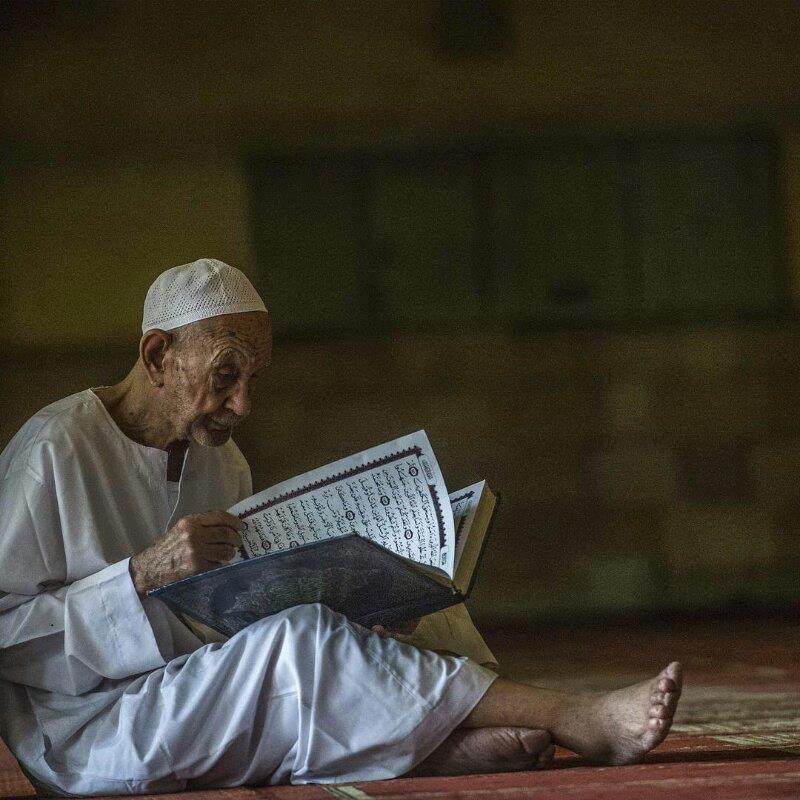|
|
Jalaluddin Rumi

Once upon a time a dervish Shaykh saw a Qur’án in the house of a blind old man.
He became his guest in (the month) Tamúz: the two ascetics were together for several days.
He said (to himself), “Oh, I wonder what the Book is (here) for, as this righteous dervish is blind.”
(Whilst he was occupied) in this reflection, his perplexity increased: (he said
to himself), “No one lives here except him.
He is alone, (and yet) he has hung a Book (on the wall). I am not (so)
unmannerly or muddled (in my wits)
As to ask (him the reason). Nay, hush! I will be patient, in order that by
patience I may gain my object.”
He showed patience and was in a quandary for some time, (till at last) it (the
secret) was disclosed, for patience is the key to joy (relief).
The guest showed patience, and of a sudden the difficult case was unveiled to
him all at once.
At midnight he heard the sound of (recitation of) the Qur’án; he sprang up from
sleep and beheld a marvel—
That the blind man was reading correctly from the Qur’án. He became impatient
and sought from him (an explanation of) that matter.
“Oh, wonderful!” he cried. “Thou with sightless eyes, how art thou reading, (how
art thou) seeing the lines?
Thou hast touched that which thou art reading: thou hast laid thy hand upon the
words of that (passage).
Thy finger, in motion, makes it evident that thou hast thine eye resting on the
words.”
He replied, “O thou who hast been separated from the body's ignorance, dost thou
feel this wonder at the work of God?
I begged of God, crying, ‘O Thou whose help is sought, I am (as) covetous of
reading the Book as (I am) of life.
I do not know it by heart: at the time of reading it, bestow on my two eyes an
untroubled light.
Give me back my eyes at that moment, so that I may take the Book and read it
plain.’
From the Divine Presence came the cry (in response): ‘O man of (devotional)
work, O thou that hast hope of Me in every grief,
Thou hast the good thought (of Me) and the fair hope that at each moment bids
thee mount higher.
Whensoever thou intendest to read (the Qur’án) or wantest the lection from
(different) copies,
At that moment I will restore thine eye, in order that thou mayst read, O
venerable being.’
Even so He did, and whenever I open the Book to read,
That all-knowing One who never becomes forgetful of His work, that honoured
Sovereign and Maker,
That incomparable King at once gives my sight back to me, like a lamp that makes
an end of the (darkness of) night.”
On this account the saint has no objection (to raise against the Divine
ordainment): whatsoever He (God) takes away, He sends compensation.
If He burn your vineyard, He will give you grapes; in the midst of mourning He
will give you festivity.
To the handless paralytic He gives a hand, to the (person who is a) mine of
grief He gives the (joyous) heart of an intoxicated one.
(The feeling denoted by the words) “We will not submit” and (the desire to
raise) objection have gone from us (saints), since there is coming a great
recompense for what has been lost.
Inasmuch as heat comes to me without fire, I am content if He extinguish my
fire.
Inasmuch as He gives light without, any lamp—if your lamp is gone, why are you
lamenting?
ϟ
Jalálu'ddín Rúmí was
a 13th-century Islamic scholar, poet, jurist, theologian and Sufi mystic
originally from Greater Khorasan in Greater Iran.
26.Jun.2024
Publicado por
MJA
|